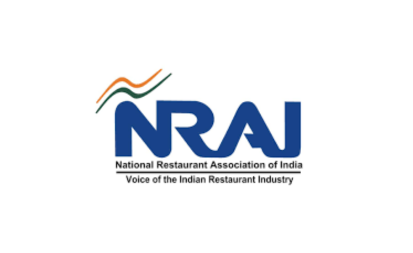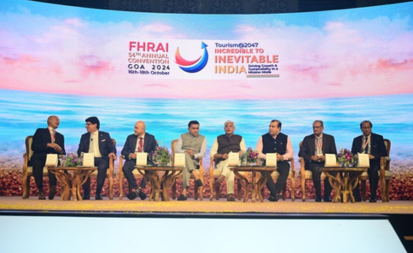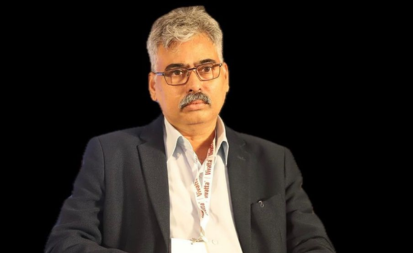National Restaurant Association of India seeks specific assistance in the forthcoming Union Budget to strengthen the Restaurant and Food Services Sector
NRAI has written a letter to the Hon’ble Finance Minister, Smt. Nirmala Sitharaman seeking certain policy & budgetary support to catalyse the pace of growth of the Indian Restaurant Industry Friday, July 19, 2024: The Restaurant Industry is a significant contributor to the national economy. Apart from contributing significantly to the direct and indirect tax revenues, it is also

- NRAI has written a letter to the Hon’ble Finance Minister, Smt. Nirmala Sitharaman seeking certain policy & budgetary support to catalyse the pace of growth of the Indian Restaurant Industry
Friday, July 19, 2024: The Restaurant Industry is a significant contributor to the national economy. Apart from contributing significantly to the direct and indirect tax revenues, it is also one of the highest employment creators in India and will directly employ 8.5 million Indians in 2024. This level of direct employment in the sector is expected to accelerate significantly and reach 10.3 million people by 2028. The size of food services sector is 33.5x of Indian Film Industry, 2.18x of the Hotel Industry and 1.26x of Pharmaceuticals Industry of India and is the third Largest Industry in India valued at INR 5.69 Lakh crores.
NRAI firmly believes that with the right policy and budgetary support in the upcoming budget, the sector will experience quicker growth. NRAI is confident that this will not only expand the industry but also create a significant number of employment opportunities in India.
With India set to be the 3rd Largest Food Services Market by 2028 overtaking Japan and the 2nd Fastest growing Food Services Industry globally after Brazil, NRAI humbly seeks the attention of the Hon’ble Finance Minister on the following issues, which will prove to be invaluable towards the development of the sector:
1. Restoration of GST Input Tax Credit (ITC)
a. It is the only industry to be pegged at 5% GST without availability of ITC; a feature designed to avoid cascading taxation. The lack of ITC not only reduces the operating margin of the business significantly, but it also enhances the capital budget for a new project significantly. This increased Project cost slows down the expansion plans, which massively impacts the overall growth of the sector.
b. The industry therefore recommends restoration of Input Tax Credit to the Restaurants while parallelly increasing the rate of GST to 12% from the current 5%. We understand that it may create a compliance burden on the smaller businesses and therefore, we feel that this can be done on revenue slabs. While restaurants below a certain revenue threshold can continue with the current GST provisions, the organised sector with higher revenues and CapEx outlay may move towards the proposed GST regime.
2. Separate Food Services Ministry/Department
c. We firmly believe that this could change the face of the industry and add tremendous impetus to the organised growth of this sector.
d. The huge repertoire and varietal of regional Indian food is one of the biggest soft powers that India possesses and is waiting to be unleashed. This can be one of biggest glue to attract and grow the overall tourism into India.
e. The total market size of our Industry, i.e., INR 5.69 Lakh Crores, constitutes approximately 2% of our national GDP. It is also one of the biggest employers of human capital in the Service Sector. However, one of the biggest stumbling blocks to the sector is the lack of a single ministry that can help it grow in a planned and focused manner. It is a highly regulated industry with policy and procedural interventions coming across levels ranging from local municipal authorities to union ministry. This not only goes against the very ethos of “Ease of Doing Business” that the Government espouses but it also leads to problems arising out of conflicting directions coming from different authorities. This significantly enhances the compliance burden, thus negatively impacting the growth.
f. There are other sectors who contribute much less to the national exchequer and employment generation but have dedicated ministries for themselves. This has helped the growth of those sectors.
g. NRAI, therefore, requests the Government to create a dedicated Ministerial department for the Restaurant Industry. Dedicated leadership, relevant policy initiatives and focused growth path can usher in an unprecedented vibrancy to the sector.
3. Grant of Industry Status
h. Given the immense contribution of the Food Services Industry to the Country’s economy, it should be accorded an industry status. This will bring in multiple benefits through Central or State industrial policies including easier finance, special schemes, subsidies, fast-track clearance processes etc. It will also encourage enterprise as well as entrepreneurship.
4. Rationalisation of Licenses/NOCs
i. On average, a restaurant is required to get 15-25 licenses / NOC to open and operate a restaurant. This myriad of licenses and permits inhibits food businesses in growing beyond their core geographies and adds to the operational complexity and compliance burden.
j. As a part of Government’s Ease of Doing Business, the Industry requests for a simplified and standardized policy across the country which will enable more businesses to explore and plan expansion across geographies creating employment and other network effects for the economy.
k. Creation of a separate ministerial department, as mentioned in point 3 above, will certainly resolve this problem.
5. Equitable & Fair E-Commerce Policy
l. The online platforms while bringing convenience have also created concerns regarding fair competition and equitable growth. Balanced policies and regulations are required to enable a level-playing field where platforms can continue to innovate while restaurants, delivery partners and consumers are protected from potentially exploitative practices.
6. Reinstating Service Export from India Scheme (SEIS)
m. The industry generates a substantial amount of foreign exchange for the country through forex denominated credit/debit cards.
n. The SEIS scheme has been discontinued recently, and the same is recommended to be reinstated with a duty credit of 10% of the forex earned by the restaurant entities to boost Industry’s growth.
7. Employee Welfare Plan
o. The restaurant industry in India employs over 8.5 million and being a heavily labour dependent industry, it’s the second largest employment industry. Due to the long working hours and physical nature of work, this industry is not the first choice of the new generation due to which number of students signing up for professional courses in Hotel Management is declining.
p. As far as Human Welfare is concerned, currently, there are no special packages or welfare funds or pension plans for the employees in this industry.
q. Therefore, industry requests the Government to introduce some innovative welfare plans funded by the Central and State Government for the employees to support them during their employment and beyond.
8. Reduction of GST on Commercial Rentals (Revenue Share)
r. For Restaurants, rentals form a large part of their fixed expenses and high GST of 18% on this, combined with no Input Tax Credit being made available, is increasing the rental or revenue share expenses by a massive 18%. This causes major stress on the operating bottom line.
s. The industry therefore requests either restoration of Input Tax Credit on GST or a significant reduction to GST on rentals and revenue share deals to 5%.
t. NRAI prefers the former to the latter.
9. Reduction of GST on Bagasse and Other Eco-Friendly Materials
u. NRAI firmly extends support to all efforts towards enhanced sustainability. Use of bio-friendly packaging material for home delivery is one of the most significant steps towards it.
v. However, currently a higher GST of 12% is levied on cutlery made with environment- friendly and biodegradable bagasse (pulpy fiber extracted from sugarcane juice) for delivery.
w. On the other hand, a rate of 5% applies on cutlery made with plastic, thus pushing many small players towards using plastic. In a tight margin food delivery space, this price differentials leads to slower adoption of eco-friendly products.
x. A reduction in GST passed will hugely accelerate the usage of eco-friendly packaging solutions.
10. Targeted Subsidy Schemes & Access to Debt Financing for SME’s
y. The industry requests subsidies on essential ingredients, utilities, and waste management to reduce operational costs for struggling restaurants, particularly in smaller towns and cities. It is difficult for start-ups to access debt financing from institutional lenders at sustainable rates.
z. Subsidized lending will lead to growth in the sector with more and more people able to access financing.
“The food service industry in India is experiencing rapid growth and holds immense potential. As a key industry, the sector contributes 1,4%to GST collection and is today second largest employers in the country. In this budget, we are advocating for a single-window policy to expedite the process of opening and operating restaurants. Regarding GST, our industry currently does not receive input tax credit on expenses, and we are hopeful for a change in this budget to allow for input tax credits.”
Kabir Suri, President of NRAI
“Additionally, we propose a dual GST policy of a 5% GST rate and a 12% GST rate with input tax credit. This approach would enable us to offset current expenses, increase capital expenditure, open more restaurants, and ultimately generate more employment and revenue for the government. I am hopeful that the Hon’ble Finance Minister will consider our requests to boost the growth of the industry. I believe that our proposal for a dedicated Ministry or Department for the Restaurant Industry could be a game-changer, leading to exponential growth in the sector.
Kabir Suri, President of NRAI
About NRAI:
National Restaurant Association of India is the voice of the Indian Restaurant Industry. Founded in 1982, by L.C. Nirula of Nirula’s, Madan Lamba of Volga, O.P. Bahl of Khyber Restaurant, R.D. Gora of Gazebo, A.S. Kamat of Kamat Restaurants & other leading restaurateurs, it represents the interests of 500000+ Restaurants, an industry valued at INR 5.69 lakh crores. Being the leading association of the Indian Restaurant Industry, NRAI aspires to promote and strengthen the Indian Food Service Sector. The Association in its 41st year has a pan India presence and is governed by a committee of members and led by a President and Office Bearers. The committee consists of over 30 Restaurant CEOs / Owners representing various national and international brands from the F&B sector. The association works closely with a network of State and City Chapters across the country.
—-
 English
English French
French German
German Italian
Italian



